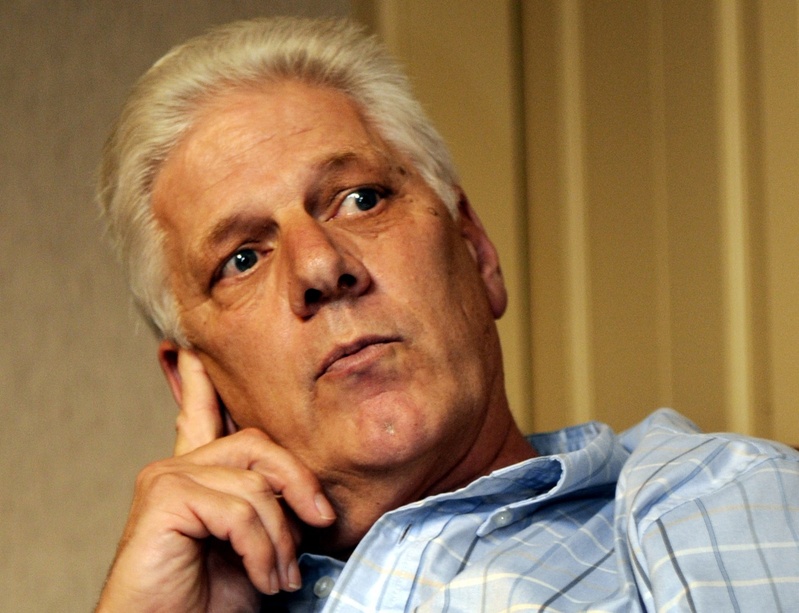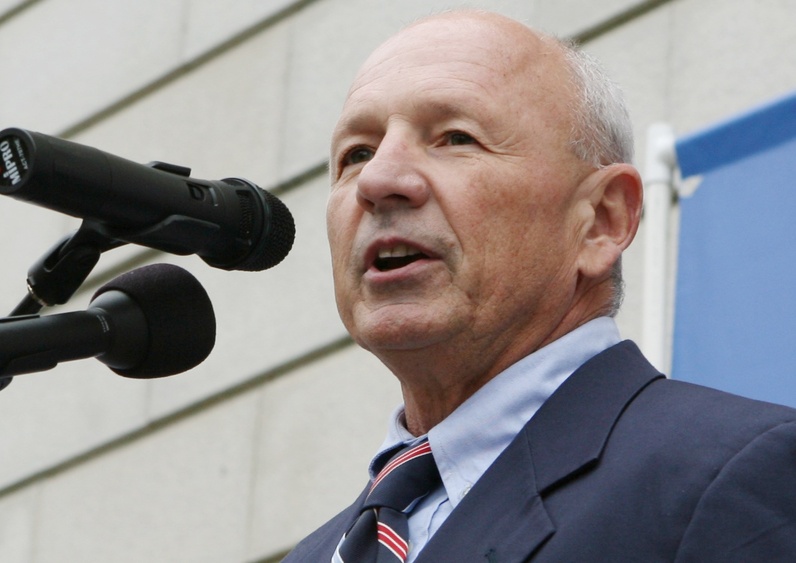CAMDEN – As debate over the same-sex marriage referendum swirled around Maine, the social hall of Our Lady of Good Hope church was a bastion of Catholic conviction after Mass last week.
About 30 people listened as two theologians from Massachusetts talked about the importance of marriage, and why allowing same-sex couples to wed is contrary to church doctrine.
Marriage is a lifelong commitment that is “oriented to the procreation and education of children,” said Angela Franks, director of theology programs at the Theological Institute for the New Evangelization at St. John’s Seminary in Brighton, Mass.
“The whole debate over marriage is fundamentally a debate about ‘What do I desire?’” said her husband, David Franks, a professor of theology at the seminary. “All the church asks is (that) we be intelligent about our desires. Is it good? Is it true? Will it lead to real happiness?”
The 90-minute session was the first in a series of statewide meetings aimed at promoting the traditional concept of marriage among the 190,000 Catholic parishioners in Maine, and perhaps persuade them to vote against legalizing same-sex marriage in the Nov. 6 referendum.
The low-key approach stands in stark contrast to 2009, when the Roman Catholic Diocese of Portland played a major role — financial and organizational — in the successful ballot drive to overturn the same-sex marriage law approved by the Maine Legislature.
Leaders of the effort to defeat the same-sex marriage effort say the church’s absence has been felt.
“The diocese has a built-in organizational structure that we don’t have in any other way,” said Bob Emrich, chairman of Protect Marriage Maine. “We miss that.”
The church made significant monetary contributions to the 2009 campaign.
Bishop Richard Malone videotaped a message that was played during Masses and ordered that additional collections be taken to support the campaign. Overall, the church donated $568,024, of which $295,404 came from the diocese’s general treasury.
It also solicited contributions from other dioceses, including $50,000 gifts from Philadelphia and Phoenix and $10,000 donations from Youngstown, Ohio, Providence, R.I., Kansas City, Kan., Newark, N.J., and St. Louis, according to campaign finance reports on file with the state.
Contributions from Catholics — in Maine and elsewhere — made up about 19 percent of the total funding for the campaign. This year, the diocese will not donate any money, raise funds from other dioceses or ask churches to pass the collection plate for the cause, said Suzanne Lafreniere, associate director of public policy for the diocese.
“This shift in venue should not be regarded as acquiescence on the issue of marriage or seen as a retrenchment,” Lafreniere said in a prepared statement. “To the contrary, it was an effort to better focus our efforts on providing the faithful with a comprehensive understanding and appreciation for the church’s teachings on marriage in all its fullness.”
Three years ago, the church also loaned its top spokesman — Marc Mutty — to Stand for Marriage Maine, the leading opposition group. It distributed pamphlets in the churches, and the bishop himself was involved in the campaign decision-making hierarchy.
Malone spoke directly with Frank Schubert, a key political consultant, about the campaign, and it was Schubert who called Malone on election night to tell him they had won. A filmmaker who was inside campaign strategy sessions said the chain of command was Schubert to Malone to Mutty.
“I think the church took a lot of heat for being involved,” said Joe Fox, one of the filmmakers behind “Question 1,” a documentary detailing the campaign. “Their stand didn’t go over very well with a sizable and vocal number of parishioners.”
The diocese declined to make either Mutty or Malone available for an interview, and instead released a statement that described the diocese involvement this year “as significantly different” from 2009.
In addition to the educational discussions around the state, the diocese is making materials available to pastors so they can talk about “how marriage is a unique relationship which unites a man and a woman with any children born from their union,” the statement said.
Lafreniere did not explain why the church is taking a different approach in 2012 and did not return phone calls seeking additional comment.
Fox and others familiar with the 2009 campaign note that Maine is without a full-time bishop, following a decision by Pope Benedict XVI in May to transfer Malone to the Diocese of Buffalo. Malone is still the administrator of the Portland diocese.
Some speculate that the diocese, which has closed schools and churches in recent years, doesn’t have the money to contribute in a significant way. Others said the backlash from parishioners — including a group called Catholics for Marriage Equality — led the bishop to move the church’s message outside of Mass. And then there’s the depiction of Mutty in the “Question 1” documentary.
Filmmakers Fox and James Nubile featured Mutty heavily in the movie, which showed him as a frustrated, sometimes angry person. After the documentary was released, Mutty apologized for using profanity in it, and said the clips used by the filmmakers didn’t tell the whole story.
“I fear I’ll be remembered for the work I did on this campaign,” he said in the documentary.
The film also showed Mutty questioning the television ads used by the campaign, saying they were overreaching in saying that same-sex marriage would be taught in schools.
“All you have to do is create doubt,” he said in the film. “You don’t have to convince people that you’re right.”
Fox, who is gay, said he thinks the church wants to distance itself from those kinds of comments, and the “embarrassment of the last campaign in the form of Marc Mutty.”
Frank O’Hara, spokesman for Catholics for Marriage Equality, said in 2009, he wrote several letters to church leadership expressing his disappointment with the church for the way it lobbied parishioners.
“It was a little shocking to some of us,” he said. “A video in Mass about a political vote? It upset even people who were agreeing with the bishop. I think that’s part of the reason they have gone more low-key.”
O’Hara also speculated that the church saw offerings drop during the campaign because people cut back on their giving to express their anger over what they perceived as heavy-handed tactics by the church hierarchy.
This time, Malone released a 22-page pastoral letter on marriage in March and then directed his staff to organize the nine statewide meetings that began last weekend in Camden and continue until Oct. 28, just nine days before the vote.
Opponents were successful three years ago in repealing the law that would have allowed gay marriage in Maine. With 58 percent turnout, gay-marriage opponents won, 53 percent to 47 percent.
This time, the question becomes one of impact. Will the church’s diminished role produce a different result?
Portland Mayor Michael Brennan, a Catholic and a same-sex marriage supporter, thinks so. Brennan spoke at a rally of supporters last week, saying he hopes his city is the first to host a same-sex wedding in Maine. The church’s diminished role this time around will help proponents, he said.
“I think it’s helpful and increases the likelihood the referendum will pass,” he said.
Marvin Druker, a political science professor from the University of Southern Maine Lewiston-Auburn campus, said the church will lose some of its effectiveness because it has limited its messaging.
Campaigns often make repeated phone calls, send several direct mailers and contact people more than once by email to encourage them to vote. Without that multi-pronged approach, it will be more difficult for the church to communicate its opposition to voters.
“If it’s not reinforced by other kinds of things, it’s going to be less of an effect,” Druker said.
Emrich, the Protect Marriage Maine chairman, worked closely with Mutty and Malone on the campaign three years ago. He described the church’s role this year as different, but not better or worse. The campaign will attempt to reach Catholics, but it won’t have the help of the hierarchy, he said.
As a lifelong Catholic, and one who’s regularly attended Sacred Heart Catholic Church in Hallowell for 20 years, O’Hara said he’s comfortable disagreeing with the church over gay marriage, while remaining faithful to other church teachings. The church is there to teach values and principles that guide everyday decisions, he said.
“The tradition is popes and bishops speak with authority on things of faith,” he said. “They don’t tell people how to act in day-to-day life. They don’t replace your conscience.”
During the Camden presentation, the Frankses, who have five children, talked about sex — heterosexual and homosexual — and the state’s role in recognizing marriage as a way to legally tie men to their offspring. They urged fellow Catholics to be sensitive — yet resolute — when talking to their friends and neighbors about why they oppose gay marriage.
During a question-and-answer period, one man asked how he should react to gay-marriage supporters who point to recent television ads that depict parents supporting gay marriage because they want their adult children to be happy.
He got two pieces of advice from the Franks.
“You can’t back off the truth,” David Franks said. “We have to do it gently. Ask the Holy Spirit to give you the words.”
Angela Franks said that while gay activists want to talk about love, the conversation should be about marriage.
“You have to redirect the conversation back to what is marriage,” she said. “Don’t get stuck in a conversation about love. Talk about marriage.”
MaineToday Media Staff Writer Susan M. Cover can be contacted at 621-5643 or at:
scover@mainetoday.com
Send questions/comments to the editors.




Comments are no longer available on this story